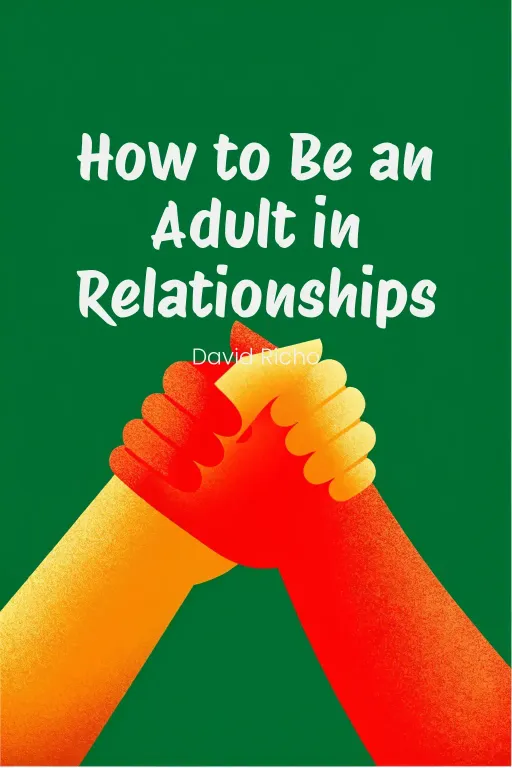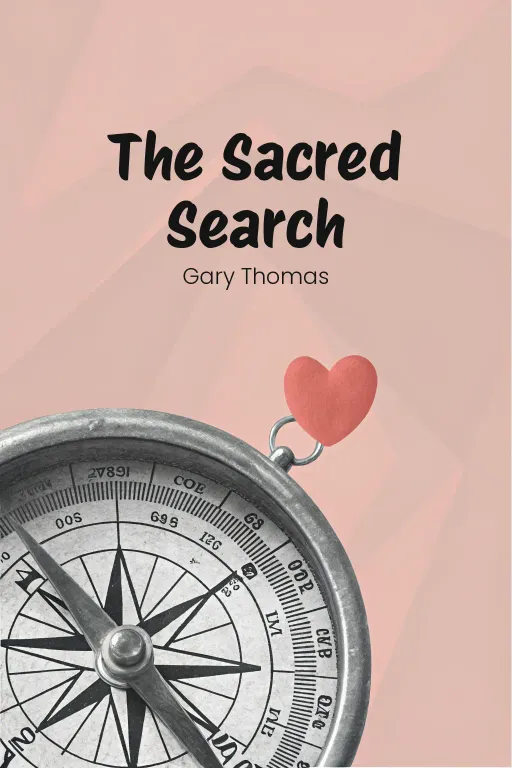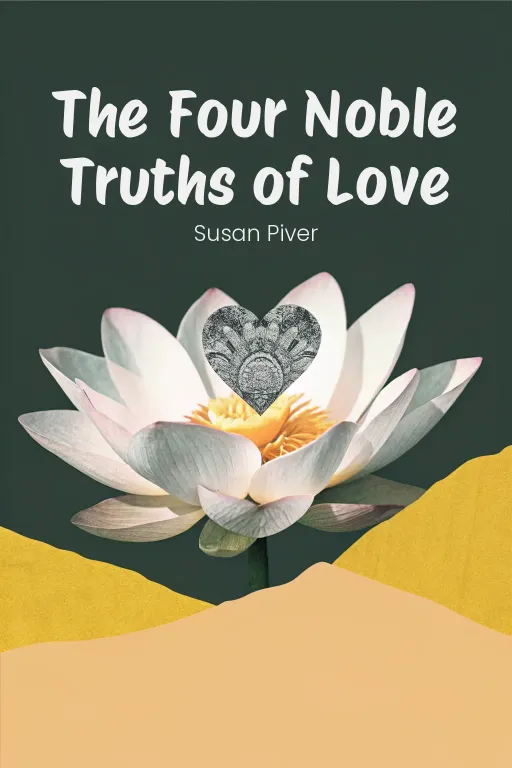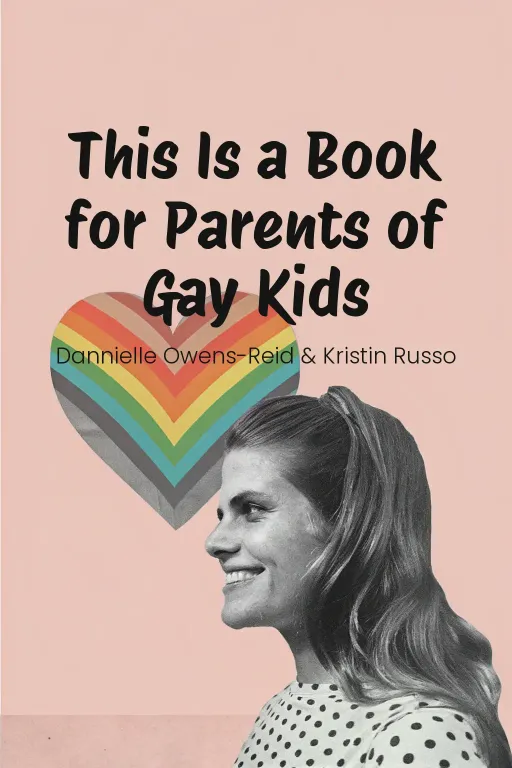
Adulting in Relationships: The Real How-To
Podcast by The Mindful Minute with Autumn and Rachel
The Five Keys to Mindful Loving
Introduction
Part 1
Autumn: Hey everyone, welcome back to the podcast! Today, we’re diving into something we all want but often fumble—healthy, fulfilling relationships. Rachel: Relationships, Autumn. The ultimate human paradox. Everyone's chasing them, but, wow, so many people struggle to actually make them work. Autumn: You nailed it, Rachel. That’s why we’re talking about David Richo’s book, “How to Be an Adult in Relationships”. It’s all about the "Five A’s"—Attention, Acceptance, Appreciation, Affection, and Allowing. He argues these are the basic ingredients for any solid relationship, whether it's with a partner, family, or even yourself. Rachel: Five A’s, huh? Sounds almost… too neat. Is he suggesting love is some perfectly assembled IKEA furniture set? Are there any parts missing? Autumn: Definitely not a simple fix. Richo “really” emphasizes how our early experiences, especially from childhood, influence how we relate. It's about understanding our past so that we can be more conscious in the present and avoid falling into old traps. Rachel: Fantastic. So, instead of simply blaming my parents, I now have to analyze my emotional baggage. Oh, that sounds… relaxing. Autumn: <Laughs> Well, unpacking that "baggage" is just a start. Richo breaks down relationships into stages like romance, conflict, and commitment, and he shows how mindfulness and self-awareness can “really” help us navigate them. Rachel: And let me guess, plenty of conflict along the way… and a whole lot of ego. Autumn: Absolutely. But today, we'll be unpacking three key takeaways from the book: First, understanding the Five A’s as the bedrock for real connection. Second, how Richo equips us to deal with our fears, arguments, and those inevitable rough patches. And third, we’ll discuss how personal growth isn’t just a solo project; it's crucial for relationships to flourish. Rachel: So, we're talking planting seeds, weathering some storms, and hopefully seeing some blooms. Alright, I’m in. Let's dig in.
The Five A’s of Healthy Relationships
Part 2
Autumn: Okay, let's dive into the Five A's. According to Richo, these are the cornerstones of healthy relationships. We're talking Attention, Acceptance, Appreciation, Affection, and Allowing. Each one plays a unique role, but together, they really set the stage for trust, intimacy, and growth. Rachel: Sounds ambitious, right? Let's unpack this. First, Attention. I get the idea of paying attention to your partner – putting down the phone, making eye contact, the basics. But Richo kinda frames it like attention has this transformative power. What's the “real” story here? Autumn: Well, Richo believes that attention actually builds self-worth. When you give someone your undivided focus, you’re essentially saying, "I see you, you matter, you are enough." And this isn't just about romantic relationships, this starts way back in childhood. Think about that quote from Winnicott, "It is a joy to be hidden but a disaster not to be found." When kids don't get that attention, it can lead to problems later in life. Rachel: So, my current ability to focus when my partner's venting about her coworker for 20 minutes straight, traces back to whether my parents watched me play Peter Pan in the school play? Autumn: In a way, yes! Consistent attention from caregivers helps a child feel valued. If it's missing, as adults, they might struggle to trust or feel lovable. And it’s not just about being there physically. Imagine a couple having dinner, and one's glued to their emails while the other is talking about their day. What message does that send? Rachel: Pretty much, "You’re less important than this guy trying to sell me extended car insurance." Autumn: Exactly. And the result is emotional distance. But, even small, focused gestures, like putting everything aside to truly listen, can rebuild trust and connection. Richo actually calls it the glue of relationships. Rachel: Okay, undivided attention: got it. But let's move to something a bit tougher: acceptance. This one feels more complicated. Isn't it natural to want to help each other improve, at least a little? Autumn: Sure, improvement is fine, but acceptance is really about respecting someone as they are, quirks and all. Richo stresses that it creates a sense of safety in the relationship, because it allows both people to be authentic. If one person feels like a project instead of a person, that's when the problems start. Rachel: So, that means no unsolicited "constructive feedback" when my partner folds socks... creatively? Autumn: Probably not the best idea! Acceptance is about saying, "I see you for who you are, not who I think you should be.” Think about the "glance of mercy" Richo talks about—looking at someone with complete respect and validation, instead of judgment. Rachel: Mercy, huh? Does that apply to those little quirks, like singing off-key in the car or binge-watching reality TV? Autumn: Definitely. Acceptance means embracing the small quirks and the big dreams, even if they don’t align with your expectations. Imagine a partner wants to quit their stable job to teach, say, yoga in Bali. Acceptance would mean supporting their dream, not shooting it down. Rachel: Okay, I’ll admit, that's a tough one! But doesn't this also create complacency? Where’s the line between accepting someone and enabling a bad habit, for example? Autumn: Great question. Acceptance isn't about excusing harmful behavior. It's about balancing understanding with boundaries. You can accept that a partner is messy without giving up your own need for a clean space. Healthy relationships navigate these differences with collaboration, not ultimatums. Rachel: I get it: accept the person, but not their excuses for leaving dishes in the sink for three days straight. Autumn: Pretty much. Which leads us to our third principle: appreciation. It’s about actively recognizing and valuing your partner. Rachel: Ah, so this is where we're supposed to say "thank you" and shower our partners with compliments like confetti? Autumn: Kind of! But it's deeper than just good manners. Appreciation shifts the focus from what's wrong to what's right. Instead of dwelling on flaws, it’s about noticing and celebrating the good stuff, big and small. Rachel: Like, actually saying, “Thanks for running errands,” instead of just expecting it? Autumn: Exactly. Richo emphasizes that a simple “thank you” can “really” change things. And it's backed by science. Research shows that couples who regularly show appreciation are happier and more connected. Rachel: Right, but let's talk about authenticity. Fake appreciation is worse than none at all—like giving someone a compliment just to smooth things over after a fight. Autumn: Couldn't agree more. Authenticity is key. An honest, heartfelt acknowledgement—"I admire how dedicated you are at work"— can mean so much more than a generic "You’re great” thrown out of obligation. Rachel: Okay, you sold me on appreciation. But affection seems obvious —everyone likes hugs and kind words, right? Autumn: Sure, but it's more complex than that. Affection isn't just grand romantic gestures; it's about small, consistent acts of love. This can be physical, like a kiss, or emotional, like sending an encouraging text before a big meeting. Rachel: So, less "flowers on Valentine’s Day" and more "remembering how they like their coffee every morning"? Autumn: Exactly. And affection has the power to heal. If a relationship hits a rough patch, even a small affectionate action, like holding hands during an argument, can help reset the tone. Rachel: Okay, but what about people who aren’t naturally physically affectionate? Are they out of luck? Autumn: Not at all. Affection is adaptable. It might mean acts of service, like fixing something around the house, or giving thoughtful gifts. It's about finding a form of expression that feels natural— but consistent— for both people. Rachel: Alright, last one: allowing. This one’s a bit abstract. What exactly are we allowing? Autumn: Allowing is about giving space— for individuality, for growth, for self-expression. It's like saying, "You’re free to explore who you are, and I'll support you." Think of it as the opposite of control or micromanagement. Rachel: Letting someone grow, even if it’s not in ways you’d personally choose for them. Autumn: Exactly. Say your partner decides to take up painting or start a side business. Allowing means encouraging that exploration, even if it's not your thing. It's about creating an environment where both of you feel free to evolve without judgment. Rachel: Makes sense. But doesn't too much "allowing" create distance? Where’s the line between supporting autonomy and staying connected? Autumn: That's where openness and communication “really” come in. Supporting someone's growth doesn’t mean you ignore your own needs. Healthy allowing works with connection, not against it— it celebrates individuality while maintaining mutual respect. Rachel: Alright, Autumn, you’ve convinced me: the Five A's are like a relationship Swiss Army knife – simple, but surprisingly versatile.
Navigating Challenges in Relationships
Part 3
Autumn: Understanding these core principles naturally leads us to explore how they address common relational challenges. Building on the foundation of the Five A’s, we're now shifting into something really practical: navigating challenges in relationships. This is where the theory meets the messy complexity of real life—conflicts, emotional wounds, the whole shebang. Rachel: Ah, so now we're heading into the stormy waters, where all those nice principles about attention and acceptance get thoroughly tested. It's like saying, "Here's how to steer the ship," and then, throwing us straight into a hurricane, huh? Autumn: It's true—conflict, misunderstandings, and even emotional pain are all pretty much inevitable. But Richo emphasizes that meeting these challenges with mindfulness, self-awareness, and, frankly, resilience transforms them into opportunities for growth, rather than, you know, destruction. Rachel: Alright, so a mature approach is basically trading in your relationship grenade launcher for a toolkit. Where do we even start with this? Autumn: With mindful conflict resolution. Conflicts aren't inherently bad, actually—they're natural. It's how couples approach conflict that makes the difference between growing together or, well, growing apart. Rachel: Right. So instead of screaming about whose fault it is that the laundry wasn't done, we try… what? Meditating over the hamper? Autumn: Not quite—but mindfulness techniques can really help. Richo suggests tools like pausing and breathing to calm emotional reactivity during arguments. For instance, instead of unleashing an impulsive, "You always leave everything to me!" you take a beat, breathe, and reframe it as, "I feel overwhelmed when I don’t have help with this." Rachel: Ah, the famous "I feel" technique. Let's be real, though—how often do people in heated arguments actually have the presence of mind to use it? Autumn: That's where practice comes in, Rachel. Being mindful during high-stress moments isn't automatic, no, but cultivating it regularly can make it second nature. Richo also points out that understanding how differences in emotional habits affect conflict is key. Rachel: Like what? One partner is a yeller, and the other does the whole ice-cold silent treatment thing? Autumn: Exactly—different conflict styles often come from personal histories. Let's take a hypothetical couple, Emily and James. Emily feels rejected when James shuts down during arguments, while James feels pressured by Emily's demands for immediate emotional engagement. Rachel: Let me guess—Emily pushes, James retreats, and they're stuck in this endless negative loop? Autumn: Right. But once they addressed these patterns, things turned around. Emily practiced giving James space to process, while James worked on expressing his feelings more quickly and clearly. That balance of space and intentional engagement made their conflicts manageable and even helped them grow closer. Rachel: So it's like breaking a bad rhythm in a dance—you've got to learn each other's tempo to make it work. Autumn: Perfect analogy. And mindfulness helps maintain that rhythm. Meditation or focused breathing during disagreements isn't just about staying calm—it shifts the focus from reacting to responding. This opens up space for empathy and collaboration instead of, you know, escalating the fight. Rachel: Okay, but what if the conflict isn't just about dinner plans or chores? What if it's tied to something deeper, like say, fear? Autumn: Great segue, Rachel. Richo dives into two major fears that almost all relational challenges really stem from: the fear of abandonment—worrying your partner will leave—and the fear of engulfment—fearing you'll lose yourself in the relationship. Rachel: Classic over vs. under-attachment, isn't it? Too much closeness freaks you out, but feeling distant leaves you panicked. Autumn: Exactly. Both fears can drive destructive behaviors. Someone afraid of abandonment might become clingy or overly dependent, while someone fearing engulfment might withdraw or avoid emotional intimacy altogether. Rachel: I mean, it's a textbook push-pull dynamic. You've got the clingy one chasing and the avoidant one running—and round and round they go. Autumn: That's precisely what happened with a fictional example Richo uses, Selene and Jesse. Selene, afraid of losing herself, kept creating emotional distance. Jesse responded by clinging tighter because he feared being abandoned. The harder he clung, the more she pulled away—it became a vicious cycle. Rachel: Okay, so how do you stop that cycle? Just yell "pause" and hope for the best? Autumn: Not quite. Richo suggests the "Triple-A" approach—Admit, Allow, and Act As If. First, admit the fear. You can't address what you won't acknowledge. For Selene, that meant recognizing her fear of engulfment was actually about her childhood experiences, not Jesse. Rachel: Okay, so step one is, you know, calling out the monster under the bed. Autumn: Exactly. Step two is allowing yourself to fully feel the fear, rather than running from it or trying to fix it immediately. Selene, for example, started journaling to explore her emotions during vulnerable moments. Rachel: Sounds uncomfortable, though. Sitting with fear instead of just pretending it's not there? Autumn: True, but that discomfort is what allows healing. And that brings us to step three: Act As If. This means practicing behaviors that challenge the fear incrementally. Selene, instead of retreating entirely, started making small efforts to stay present during tense conversations. Jesse, meanwhile, worked on giving her the space she needed without taking it personally. Rachel: So you fake being secure until you actually internalize it? Autumn: Essentially, yes. It’s a way of breaking old patterns by acting contrary to your fears, which eventually rewires those emotional habits. Rachel: Okay, but let's take it even deeper here. What about people carrying heavier emotional baggage—like unresolved grief or even childhood wounds? Autumn: That's a huge part of the picture, Rachel. Unprocessed pain and grief often shape how we approach relationships, even if we're not consciously aware of it. Richo emphasizes that we have to confront and mourn these losses to prevent them from sabotaging our connections. Rachel: Mourning? You mean, like, grieving over old heartbreaks or unmet needs? Autumn: Exactly. Grief isn’t just about death—it's also about losing dreams, relationships, or even the childhood you wish you had. Someone who lacked affection growing up, for instance, might still be mourning that unmet need as an adult. Rachel: And until they deal with it, they're basically dragging that old pain into every new relationship, right? Making their partner pay for baggage they didn't even know they signed up for. Autumn: Right. That's why Richo encourages activities like journaling to process these emotions. Questions like, "What losses am I still grieving?" or "What childhood needs am I expecting my partner to fulfill?" can, you know, really open the door to self-awareness. Rachel: Let me guess—self-awareness also means cutting yourself some slack. Autumn: Definitely. Forgiveness, both of yourself and others, is crucial for healing. It's about recognizing, "Yes, I experienced pain, but I'm not defined by it." That “really” frees you to move forward with an open heart. Rachel: So, confront the grief, work through it, and stop letting it hijack your relationships. Sounds about right. Autumn: Exactly. By addressing conflicts mindfully, confronting fears with compassion, and mourning past wounds, anyone can transform relational challenges into stepping stones for deeper connection. Rachel: Alright, so instead of facing conflicts with ego and fear, we approach them like a mindful, emotionally curious team. Not going to lie—sounds like a lot of work, but the payoff seems worth it.
Fostering Personal and Relational Growth
Part 4
Autumn: When we have the right tools to face life's challenges, the focus naturally shifts to personal and relational growth. This is where the concepts we've discussed, like the Five A’s and conflict resolution, really start to pay off. By committing to self-improvement and embodying these principles, we're not just stabilizing our relationships, but really elevating them. Rachel: Okay, so we’re entering the “level-up” portion of the podcast, right? Where we try to turn all those good intentions into actual, tangible results. So, Autumn, what’s the real secret here? Autumn: Well, Rachel, the real secret is understanding that personal growth fuels relational growth. As Richo explains, the healthier we are as individuals, the healthier our connections become, it’s really that simple. It's about developing authenticity, showing compassion not just for your partner, but for yourself too, and recognizing that emotional resilience—on both sides—is what keeps things afloat. Rachel: Sounds like there's a lot to unpack there. Where do we even start with something like that? Autumn: Let’s start with self-parenting. It’s a powerful practice Richo talks about, and it's all about nurturing our inner child. So, instead of expecting a partner to fill the voids, we address those unmet needs or past hurts from childhood ourselves. Rachel: Okay, inner child... I always sort of picture mine just sulking in the corner somewhere, maybe with a half-eaten popsicle. But alright, walk me through this "self-parenting" thing. What does it look like in practice? Autumn: Well, it’s about becoming your own source of emotional support. Take Emma, for example. Imagine she grew up in a household where nothing was ever good enough, achievements were always dismissed. As an adult, she is constantly looking for validation from her partner. Every compliment feels like a lifeline to her sense of worth, right? And, of course, every criticism feels like a major threat. Rachel: So, she's replaying her childhood dynamic in her adult relationship? That sounds…exhausting, frankly, for everyone involved. Autumn: Exactly! But, through self-parenting, Emma can begin to break that cycle. She starts by pinpointing that wounded aspect of herself—the inner child that believes she's only worthy when she's achieving something or getting praised. She starts asking herself, “What does my younger self need to hear right now?” Simple reassurances, like “You're enough, even if you're not being 'productive,'” become her new internal script. Rachel: So, she's basically giving herself what she wished she'd received from her parents? Autumn: Exactly that. And it doesn’t just stop with the words. Emma also reconnects with things that genuinely made her happy as a child, painting, in her case. By reigniting that inherent creativity, she builds a sense of fulfillment that doesn’t depend on someone else's approval. Rachel: Okay, so, she's healing those old wounds, and—bonus—her partner no longer has to carry the weight of being her sole emotional support. Autumn: Precisely. Self-parenting fosters emotional independence, which then creates healthier, more balanced relationships. Rachel: That's great, but life is not all about just solving those old wounds, right? What about the everyday balancing act, the dualities, you know, like celebrating one thing while simultaneously mourning another? That's got to throw anyone's emotional balance off. Autumn: Actually, that’s Richo's next point: embracing the dualities, the contradictions of life. Growth doesn't mean avoiding sadness or struggle. It means learning to hold space for those opposing feelings, honoring both joy and sorrow in the same moment. Rachel: Okay, alright, give me an example here. Autumn: Think about Michael. He's going through one of the happiest and saddest times of his life simultaneously. He’s mourning the recent passing of his father while celebrating the birth of his first child. At first, he tries to compartmentalize, ignoring the sadness when he’s with the baby and suppressing the joy when he's thinking about his dad. But, of course, it’s not working. Rachel: Let me guess, it all comes pouring out at the worst possible moments, right? Autumn: Exactly! But, through guided meditation, Michael starts to acknowledge both sets of emotions. Instead of labeling grief as this "bad" thing or joy as this "good" thing, he allows them to co-exist. The act of reflecting—saying, “Grief is the price of love, and it actually makes the joy even richer”—helps him kind of integrate those experiences. Rachel: So, instead of fighting those dualities, you lean into them, like you're balancing on a tightrope. Autumn: That’s the perfect analogy. Accepting life's contradictions isn’t just liberating; it’s really transformative. It builds emotional resilience, which is really essential for showing up genuinely in relationships, even when everything feels tough. Rachel: Alright, so authenticity brings us back to the practical stuff. The famous Five A's. How do we put those into practice for growth, both individually and as a couple? Autumn: Great question. Richo breaks it down beautifully. Let’s take attention, for example. It starts with setting aside dedicated time for undivided focus, whether that’s listening intently to someone talk about their day or just being fully present during a meal together. Rachel: Quality time together, not just 'phone time' together, right? Makes total sense. What about acceptance, then? Autumn: That’s really about embracing imperfections. Practicing mindfulness to notice when judgment starts to creep in, maybe during a disagreement, and then consciously choosing empathy in that moment instead. It’s really recognizing that your partner doesn't need to be perfect to be lovable. Rachel: Alright, now appreciation. I'm on board with thanking my partner for, like, packing my lunch, but what about gratitude when it’s hard to find, when you're just not feeling it? Autumn: That's where small shifts in focus really make a difference. Even during tough times, you can usually find something positive to value. A consistent ritual of sharing three very specific “thank yous” each day, for example, really helps to build that mindset. It brings a sense of abundance to the relationship. Rachel: Simple, but effective. What about affection? Is this about emotional and physical nurturing? Autumn: Exactly! But the key is consistency here, not grand gestures. Small acts, doing things like offering a hug during a difficult moment or even sending an encouraging text during the day, strengthens those connections on a daily basis. Rachel: And then we've got allowing—the wildcard. People struggle with giving each other space, right? When space might create distance. So, how do we approach that one? Autumn: By trusting that individuality actually makes a relationship stronger when it's truly supported. Allowing your partner to explore new interests or embrace change doesn't have to mean drifting apart. It means holding space for their growth while maintaining your emotional connection. Rachel: So, it's like cheering them on from the sidelines, but staying available if they need, like, a helping hand? Autumn: It’s exactly that. Practicing the Five A’s regularly helps create a solid foundation—not only for relational harmony, but also for genuine personal fulfillment. Rachel: Alright, I can see how this all fits together now. Personal growth, whether it's in yourself or in your relationships, isn't about doing everything flawlessly. It's more about learning, stretching, and just showing up fully. Right? Autumn: Perfectly said, Rachel. These practices, while sometimes challenging, really transform relationships into spaces where both people can truly become their best selves without losing their vital connection.
Conclusion
Part 5
Autumn: So, to sum it all up, David Richo’s “How to Be an Adult in Relationships” really provides a toolkit for navigating the sometimes messy, always complex world of love. The Five A’s—Attention, Acceptance, Appreciation, Affection, and Allowing—they're really the foundation for deeper, more meaningful relationships, whether that's with a partner, a friend, or even yourself. Rachel: Yeah, and what really struck me is how these principles aren't just about romantic relationships, are they? They're about showing up as your best, most authentic self, period. Whether it's practicing acceptance instead of judgment, or understanding how past wounds and fears shape our connections, it's all about doing the hard, necessary work. Autumn: Exactly! And that "real work" involves confronting those fears abandonment, engulfment, processing the grief of unmet needs. It's about realizing that personal growth directly fuels growth in our relationships. Practicing mindfulness, empathy, and self-awareness allows us to not just survive challenges, but actually transform them into opportunities for deeper connection with others. Rachel: So, the bottom line is healthy relationships don't just magically appear. They're built—brick by brick—with intention, patience, and a willingness to wade through some messy stuff. Not always easy, is it? But, like Richo says, love is a practice, not just some fleeting emotion. Autumn: Absolutely. And here's the key takeaway, everyone: just start where you are. Maybe it's giving someone you love your undivided attention for a few moments today. Maybe it's thanking them for something small they did. Or even just recognizing your own fear and sitting with it. Growth begins with these simple, intentional steps. Rachel: So, there you have it, folks. Relationships aren’t a magic trick; they're a craft. Pick up your tools, take a good, hard look in the mirror, and start building. Autumn: Thanks for joining us today on this journey through “How to Be an Adult in Relationships”. Until next time, take good care of yourselves—and each other!









